[Feature] Coal-reliant families lack warmth this winter
Helping hands in short supply as virus resurgence dampens typical year-end giving events
By Choi Jae-heePublished : Dec. 29, 2021 - 14:39
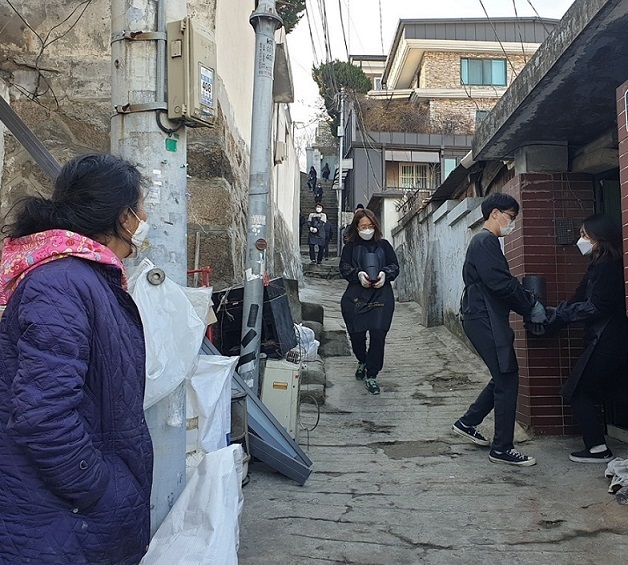
This winter has been colder to Yang Jae-sook, a 57-year-old woman living in a shanty town near the Naksan Mountain Trail in northern Seoul.
“I need about nine coal briquettes (a day) to keep the house warm, but these days I’m trying to burn less because donations have decreased recently amid the COVID-19 pandemic,” Yang said.
“Also, the price of the fuel has become quite burdensome, making me want to wait for volunteers to arrive with briquettes,” said the woman, who has relied on the old-fashioned form of fuel for the past 20 years.
Cylindrical shaped with several holes drilled into it, a briquette for residential heaters costs 639 won ($0.54). The price, controlled by the government, was last raised in 2018, by nearly 20 percent.
Yang is one of nearly 90,000 low-income households across the country that still rely on coal briquettes, much cheaper than oil or gas, to fire boilers at home, which heat water for the traditional ondol heating system.
Coal, which can release highly toxic carbon monoxide when it burns, was the main fuel for residential heating in Korea until early 1980s.
Now, district heating covers most of the urban areas where people live in apartment complexes. Many homes not covered by the community heating system have transitioned to cleaner fuels such as heating oil or gas.
Subsequently, domestic consumption of coal briquettes has dropped from 1.6 million tons in 2014 to a record low of 500,000 tons this year, according to industry data.
Yet, the fuel is still an essential winter commodity for people fighting the cold in shacks and makeshift houses.
On Dec. 22, before the season’s coldest weather gripped the nation over the weekend, a team of about 20 volunteers delivered four families, including Yang‘s, a Christmas present -- some 200 briquettes neatly stacked at their home.
The delivery was organized by the Coal Briquettes for Neighbors in Korea, a private volunteer organization that also leads fundraising for coal donations.
“I need about nine coal briquettes (a day) to keep the house warm, but these days I’m trying to burn less because donations have decreased recently amid the COVID-19 pandemic,” Yang said.
“Also, the price of the fuel has become quite burdensome, making me want to wait for volunteers to arrive with briquettes,” said the woman, who has relied on the old-fashioned form of fuel for the past 20 years.
Cylindrical shaped with several holes drilled into it, a briquette for residential heaters costs 639 won ($0.54). The price, controlled by the government, was last raised in 2018, by nearly 20 percent.
Yang is one of nearly 90,000 low-income households across the country that still rely on coal briquettes, much cheaper than oil or gas, to fire boilers at home, which heat water for the traditional ondol heating system.
Coal, which can release highly toxic carbon monoxide when it burns, was the main fuel for residential heating in Korea until early 1980s.
Now, district heating covers most of the urban areas where people live in apartment complexes. Many homes not covered by the community heating system have transitioned to cleaner fuels such as heating oil or gas.
Subsequently, domestic consumption of coal briquettes has dropped from 1.6 million tons in 2014 to a record low of 500,000 tons this year, according to industry data.
Yet, the fuel is still an essential winter commodity for people fighting the cold in shacks and makeshift houses.
On Dec. 22, before the season’s coldest weather gripped the nation over the weekend, a team of about 20 volunteers delivered four families, including Yang‘s, a Christmas present -- some 200 briquettes neatly stacked at their home.
The delivery was organized by the Coal Briquettes for Neighbors in Korea, a private volunteer organization that also leads fundraising for coal donations.
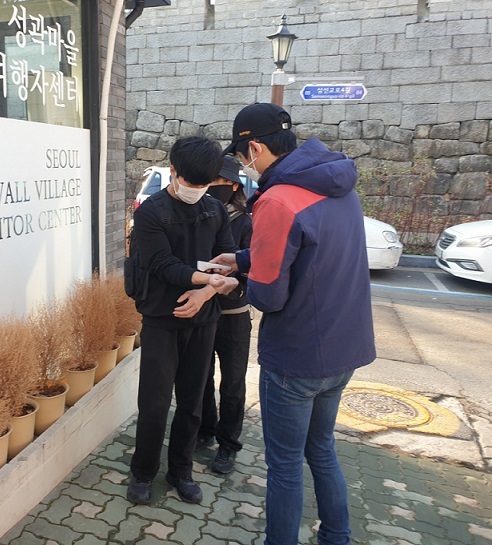
The volunteers began the day’s work by putting on cotton work gloves and aprons. All, of course, had to go through today’s ubiquitous body temperature checks. They were then each handed one or two pieces to carry.
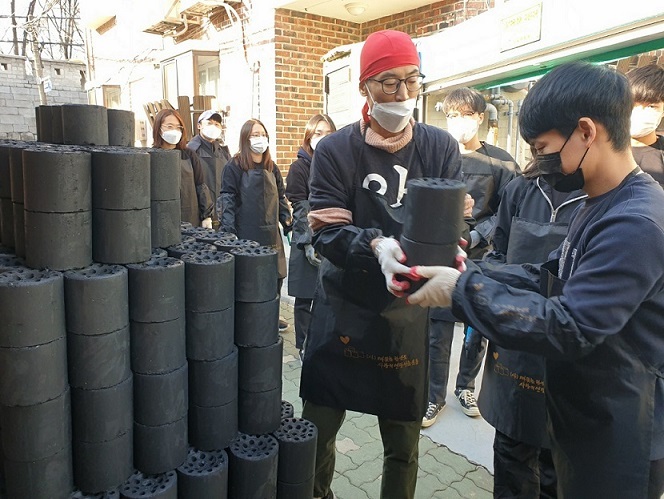
“It is my first time touching briquettes. I’m happy that I could help the elderly stay warm during wintertime,” said the youngest in the team, Hong Ah-in, who is 9 years old.
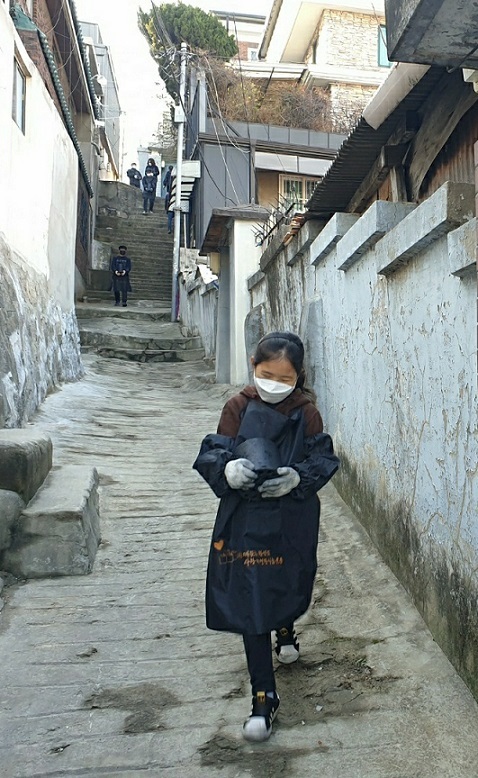
Walking down a narrow alleyway with steep steps with the briquettes weighing about 3 kilograms each, beads of sweat were soon dripping from volunteers’ foreheads and the tips of their noses. A total of 800 briquettes were delivered to four households in the village, including Yang’s, that day.
“You can’t wear padded jackets while delivering briquettes. Even short walks get you so heated. With a mask on, I become exhausted more easily, but I feel rewarded when the elderly and children look relieved by a pile of briquettes delivered to their houses,” said Kim Beom-joong, a 46-year-old who works as a freelance emcee and stage actor. He said he has joined coal briquette deliveries like this for almost a decade.
“Slum dwellers, especially the lonely elderly, have been hit hard by the COVID-19 pandemic. They’re exposed to higher risk of virus transmission due to their clustered houses, while struggling to make a living amid heavy job losses for low-wage workers,” Kim added.
“You can’t wear padded jackets while delivering briquettes. Even short walks get you so heated. With a mask on, I become exhausted more easily, but I feel rewarded when the elderly and children look relieved by a pile of briquettes delivered to their houses,” said Kim Beom-joong, a 46-year-old who works as a freelance emcee and stage actor. He said he has joined coal briquette deliveries like this for almost a decade.
“Slum dwellers, especially the lonely elderly, have been hit hard by the COVID-19 pandemic. They’re exposed to higher risk of virus transmission due to their clustered houses, while struggling to make a living amid heavy job losses for low-wage workers,” Kim added.
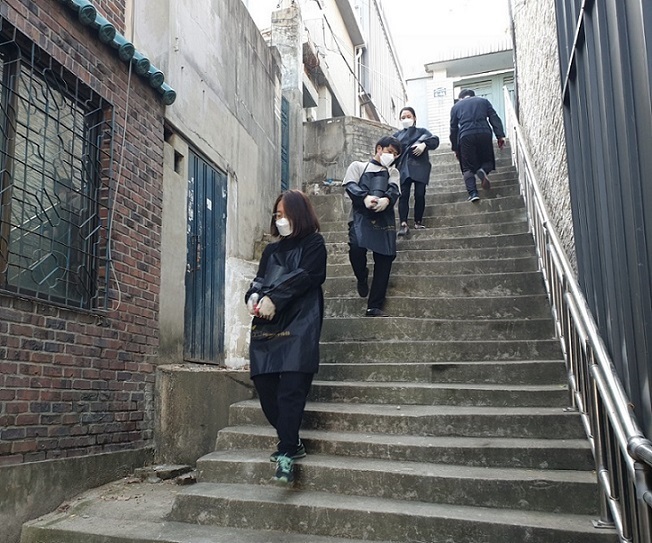
People living here were hit with a double whammy of deepening poverty and a decline in livelihood assistance, including free briquette deliveries, according to Coal Briquettes for Neighbors.
The organization reported a drastic cut in both donations and the number of volunteers, its spokesperson Cho Min-gon said.
Monetary donations have shrunk by some 60 percent over the past two years since the pandemic started to sweep through the country, the official revealed.
“Before the COVID-19 outbreak, we used to deliver nearly 3 million coal briquettes to low-income families across the nation, but last year we managed to deliver less than 2 million,” the official said.
Around this time of the year, the organization used to get large groups of one-time volunteers, as briquette deliveries are one of the typical photo events for companies and organizations. But the resurgence of the virus has killed the year-end peak season.
“The number of groups applying to join our volunteer event -- mostly companies, churches and government agencies -- dropped by half. Some companies recently canceled their participation over virus concerns,” Cho said.
Running short of briquettes, some shanty town dwellers resort to electric pads, gas heaters and even instant hot packs to survive the winter.
The organization reported a drastic cut in both donations and the number of volunteers, its spokesperson Cho Min-gon said.
Monetary donations have shrunk by some 60 percent over the past two years since the pandemic started to sweep through the country, the official revealed.
“Before the COVID-19 outbreak, we used to deliver nearly 3 million coal briquettes to low-income families across the nation, but last year we managed to deliver less than 2 million,” the official said.
Around this time of the year, the organization used to get large groups of one-time volunteers, as briquette deliveries are one of the typical photo events for companies and organizations. But the resurgence of the virus has killed the year-end peak season.
“The number of groups applying to join our volunteer event -- mostly companies, churches and government agencies -- dropped by half. Some companies recently canceled their participation over virus concerns,” Cho said.
Running short of briquettes, some shanty town dwellers resort to electric pads, gas heaters and even instant hot packs to survive the winter.
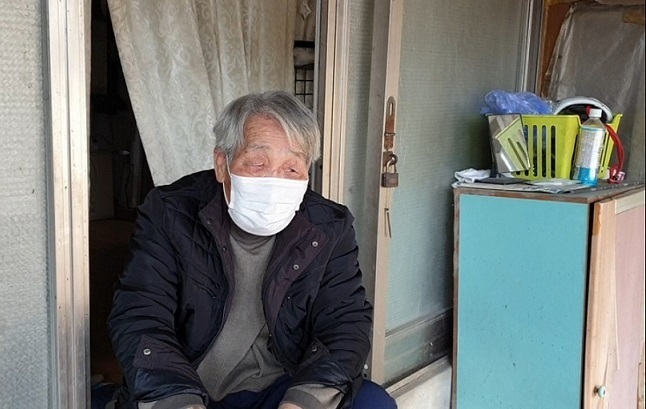
“Before I received briquettes today, I turned on the gas heater even though I was worried about fire risks. But it wasn’t enough to keep my room warm, with cold air coming through the wall,” said Lee Geun-bok, 84, who has lived in the neighborhood for more than 30 years.
“Thanks to the volunteers, I think I can stay warm until March,” Lee said.
By Choi Jae-hee (cjh@heraldcorp.com)
“Thanks to the volunteers, I think I can stay warm until March,” Lee said.
By Choi Jae-hee (cjh@heraldcorp.com)









![[Kim Seong-kon] Democracy and the future of South Korea](http://res.heraldm.com/phpwas/restmb_idxmake.php?idx=644&simg=/content/image/2024/04/16/20240416050802_0.jpg&u=)








![[KH Explains] Hyundai's full hybrid edge to pay off amid slow transition to pure EVs](http://res.heraldm.com/phpwas/restmb_idxmake.php?idx=652&simg=/content/image/2024/04/18/20240418050645_0.jpg&u=20240418181020)

![[Today’s K-pop] Zico drops snippet of collaboration with Jennie](http://res.heraldm.com/phpwas/restmb_idxmake.php?idx=642&simg=/content/image/2024/04/18/20240418050702_0.jpg&u=)